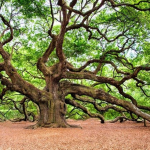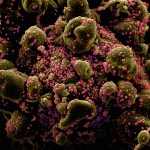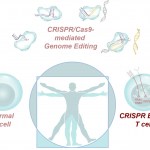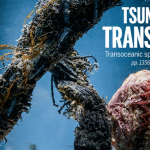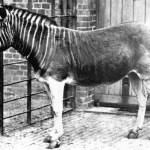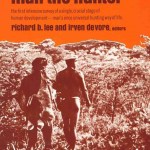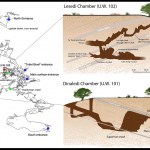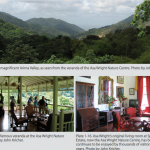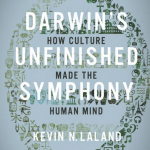Sudden oak death, caused by the pathogen Phythophthora ramorum, is one of the most ecologically devastating forest diseases in North America, responsible for the deaths of millions of oaks and tanoaks along the coast.
Science to the rescue? After the success of genetically modified organisms in things like insulin and food, a recent trend is Genetically Rescued Organisms. These GROs would use science to create natural resistance, like a vaccine for plants, and reduce the impact of altered species composition, released carbon pools, and greater fire risk the deaths bring.
Before that can…
Life Sciences
Imagine trying to cope with a pandemic like COVID-19 in a world where microscopic life was unknown. Prior to the 17th century, people were limited by what they could see with their own two eyes. But then a Dutch cloth merchant changed everything.
His name was Antonie van Leeuwenhoek, and he lived from 1632 to 1723. Although untrained in science, Leeuwenhoek became the greatest lens-maker of his day, discovered microscopic life forms and is known today as the “father of microbiology.”
Visualizing ‘animalcules’ with a ‘small see-er’
Leeuwenhoek opened the door to a vast, previously unseen…
With people confined to their homes, there is more interest in home-baked bread than ever before. And that means a lot of people are making friends with yeast for the first time. I am a professor of hospitality management and a former chef, and I teach in my university’s fermentation science program.
As friends and colleagues struggle for success in using yeast in their baking – and occasionally brewing – I’m getting bombarded with questions about this interesting little microorganism.
A little cell with a lot of power
Yeasts are single-celled organisms in the fungus family. There are more…
COVID-19 is caused by a coronavirus called SARS-CoV-2. Coronaviruses belong to a group of viruses that infect animals, from peacocks to whales. They’re named for the bulb-tipped spikes that project from the virus’s surface and give the appearance of a corona surrounding it.
A coronavirus infection usually plays out one of two ways: as an infection in the lungs that includes some cases of what people would call the common cold, or as an infection in the gut that causes diarrhea. COVID-19 starts out in the lungs like the common cold coronaviruses, but then causes havoc with the immune system…
After a newborn (born to a mother infected with the 2019 novel coronavirus disease (COVID-19) testing positive for COVID-19 infection within 36 hours of birth, there were concerns about whether the virus could be contracted in the womb. A new study finds that COVID-19 does not pass to the child while in the womb. The women in the small study were from Wuhan, China, in the third trimester of pregnancy and had pneumonia caused by COVID-19. However, it only included women who were late in their pregnancy and gave birth by caesarean section.
There were two cases of fetal distress but all nine…
In the first-ever (sanctioned) investigational use of multiple edits to the human genome, a study found that cells edited in three specific ways and then removed from patients and brought back into the lab setting were able to kill cancer months after their original manufacturing and infusion.
This is the first U.S. clinical trial to test the gene editing approach in humans, and the publication of this new data today follows on the initial report last year that researchers were able to use CRISPR/Cas9 technology to successfully edit three cancer patients' immune cells. The ongoing study is a…
Life has been growing on Earth for about 4 billion years, and during that time there have been a handful of mass extinctions that have wiped out a large percentage of complex lifeforms. Asteroid impact, volcanic eruption, climate change, anoxia, and poison have dispatched untold numbers of once-successful species to total oblivion or a few lucky fossils. Species also die off regularly for much less spectacular reasons, and altogether about 98% of documented species no longer exist.
Cry me a river, you say, without all that death there would have been no gap for vertebrates, for mammals, for…
When the big tsunami hit Japan in 2011, many objects were washed out to sea. This flotsam provided for a giant "rafting event." A rafting event is when animals, plants, etc. float across an otherwise uncrossable body of water and end up alive on the other side. With this particular event, I don't think very many terrestrial life forms crossed the Pacific, but a lot of littoral -- shore dwelling and near shore -- animals and plants did.
Even though the Pacific ocean is one big puddle and you would think that any organism anywhere in it could just go to any other part of the ocean, like in the…
By U.S. Fish and Wildlife Service Headquarters [CC BY 2.0 (http://creativecommons.org/licenses/by/2.0) or Public domain], via Wikimedia Commons
Got bugs? Get a bat. As many species of bats are insectivores, they help keep insect populations in check. Hurricane Harvey has been devastating to people, animals and property. So it probably comes as no surprise that there are many volunteers dedicating their time to saving animals displaced by Hurricane Harvey as well. From squirrels, cats and dogs to...you guessed it...bats. It turns out that bats are not very…
“It will shine still brighter when night is about you. May it be a light to you in dark places, when all other lights go out.” ―Galadriel, LOTR, J.R.R. Tolkien
Well, we've been anticipating it for months (or years), but this is our very first time meeting up since the total solar eclipse here at Starts With A Bang! Did you get to see it? Was it as spectacular for you as it was for me? I'm already looking forward to 2024, but you can look forward to a podcast coming this next week from me on just how spectacular it was! (With a judicious dose of physics and astrophysics, of course.) Patreon…
People talk about resurrecting the Mammoth, the Dodo, the Quagga, or the Tasmanian devil, or any number of extinct (or mostly extinct) creatures. I'm all for that. I suggest removing cattle farming in Nebraska, Wyoming, Montana and adjoining areas of Canada, and repopulating the region with extinct megafauna. That would just be cool.
There are difficulties with this, including figuring out exactly how to piece together the genome for the extinct animal, how to get a good level of genetic diversity in the neo-founding population, and how to raise the critter up from a zygote. For all these…
My father in law is an excellent amateur mixologist. I don't drink alcohol very often, but we're all up at the cabins, so last night I had a paper plane. And I believe this is what led to a night of strange and extensive dreams, and in my dreams was my recently deceased PhD adviser, Irv DeVore. (Irv was not dead in the dream.) DeVore is famous for having initiated, with Richard Lee, the first scientific study of extant living foragers, and they worked with the Ju/'Honasi of Botswana/Namibia/South Africa.
So, it was strange to have the lingering dream on my mind as I opened the latest…
“Already in my original paper I stressed the circumstance that I was unable to give a logical reason for the exclusion principle or to deduce it from more general assumptions. I had always the feeling, and I still have it today, that this is a deficiency.” -Wolfgang Pauli
There's never a shortage of scientific topics to explore and take interest in here at Starts With A Bang! While we have our usual slew of articles, controversies, opinions and more this week, I'm also so pleased to share a new podcast with you! This month, thanks to our Patreon supporters, we took on a very bold topic, the…
You've heard of Homo naledi, the strange "human ancestor" (really, a cousin) found a while back in South Africa. There were many skeletal remains in a cave, in the kind of shape you'd expect if they had crawled into the cave and died there, not much disturbed. They look enough like other members of our genus, Homo, to be called Homo, but if we assume that increase in brain size is the hallmark of our species, they seem to be an early grade.
Over the last ten years, we have come to appreciate the fact that our genus may have differentiated into multiple species that did not have a large brain…
The Lese people practice swidden horticulture in the Ituri Forest, Congo (formerly Zaire). Living in the same area are the Efe people, sometimes known as Pygmies (but that may be an inappropriate term). The Efe and Lese share a culture, in a sense, but are distinct entities within that culture, as distinct as any people living integrated by side by side ever are. The Efe are hunter-gatherers, but the gathering of wild food part of that is largely supplanted by a traditional system of tacit exchange between Efe women and Lese farmers, whereby the Efe provide labor and the farmers provide…
The Neotropical Companion by John Kricher came out years ago, in the late 80s if I recall correctly. I've got a copy of it around somewhere.
I loved that book because it did a great job integrating all the things in one place: animals, plants, habitats, evolution, etc. Even though I was working in the paleotropics at the time, I found it informative.
Then, more recently, I got a revised version of the same book. I've got it around somewhere. It is from the 1990s, I think. Great book, same idea as the first one, but with more in it, and a somewhat larger format. This dates to after my…
Among quacks, epigenetics is the new quantum theory.
I know I've said that before, but it's worth saying again in response to a new quack I've just discovered, courtesy of an article in The Daily Mail Fail by one Dr. Sara Gottfried pimping her books and health empire, From taking a sauna to drinking pinot noir, a fascinating book by a hormone doctor reveals how to... switch off your bad genes and live longer.
Epigenetics. She's talking about epigenetics. Of course, she keeps using that word. I do not think it means what she thinks it means. Indeed, if what's in this article is a taste of what…
Darwin's Unfinished Symphony: How Culture Made the Human Mind is a new book on cultural evolution in humans from a biological perspective.
This is an interesting book and a good book, and I recommend it, but I need to add a strong caveat. The author could have made a more compelling argument had he more carefully studied and used some of the prior work that makes a similar argument. He strangely cites Terry Deacon in two places (once as a psychologist, incorrectly) for work Deacon has done, but seems to ignore Deacon's key thesis, which is pretty much the same as Laland's key thesis. (See:…
“I hope that in this year to come, you make mistakes. Because if you are making mistakes, then you are making new things, trying new things, learning, living, pushing yourself, changing yourself, changing your world. You’re doing things you’ve never done before, and more importantly, you’re doing something.” -Neil Gaiman
Another week, another slew of fantastic stories down here at Starts With A Bang! If you've been wondering about what the Starts With A Bang Podcast is going to be about this month, wonder no longer! It's on the expanding Universe, and what's still so controversial about all…
Of all the forms of unproven and disproven alternative medicine being enthusiastically "integrated" into science-based medicine by proponents of "integrative medicine" (formerly—and sometimes still—known as "complementary and alternative medicine," or CAM), so-called "traditional Chinese medicine" (TCM) is clearly among the most popular and seemingly the most accepted. After all, acupuncture, the most famous modality in the TCM armamentarium, is offered in dozens of academic medical centers and hundreds of medical centers in the US, but it goes beyond that. It doesn't matter that the totality…
